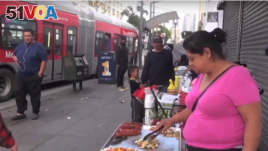11 March, 2017
People sell goods and food on the streets of many American cities, often without permits. Many of these sellers are immigrants, and some are in the United States without government permission.
Street vending is illegal in Los Angeles, California. People who do it anyway can be fined up to $1,000 and face six months in jail.
For years, activists have asked Los Angeles officials to change the laws. Last week, the city council approved a plan to decriminalize street vending. Officials are worried that, under new national efforts to crack down on illegal immigration, arresting the sellers will result in some of them being deported.
Thank you, Donald Trump
Merced Sanchez sells goods on the city's sidewalks.

Guadalupe Santiago sells hot dogs from a small cart in Los Angeles, California. (A. Martinez/VOA)
"For what we couldn't accomplish in three years, I thank Mr. Donald Trump. Thanks to him, the council mobilized. This means peace. It means being able to work without fearing that the police will show up."
Sanchez says many people who are in the U.S. without government permission become street vendors because finding a job is difficult for them. She says the new city law legalizing street vending ends the threat of arrest. She says the change reduces vendors' fears of being deported.
A first step to economic security
Doug Smith works for the Los Angeles Street Vendor Campaign. He says, for many people, selling goods on the street is the first step to becoming economically secure.
"It's the first way to start to build a business, and that is why we really prioritize the entrepreneurship elements of it. It's about more than just permitting something. We want to actively create technical assistance and support to help people build a business and achieve economic mobility."
The new law takes effect in a few weeks. Legalization means vendors will need to pay for permits and will have to obey other rules.
Guadalupe Santiago is a street vendor. She has two children. She says she will be happy to pay to get a permit and meet other requirements if following those rules means she does not need to be afraid of being arrested and deported.
"It's good for them to give us a permit. If they ask me for a better cart, I will need to buy it because I know it will be for my own good and for the city's."
Who will pay for it?
Norm Lagner owns a popular Los Angeles restaurant. He wants street vendors to be able to make a living. But he worries whether the city has enough money to enforce any new rules.
"You can't have any enforcement of the laws unless you have money to pay for it, and there is no money to pay for it. So I personally think it's a bad idea at this time."
Lagner, who supports President Trump, adds that he does not want to make things easier for people who are in the U.S. illegally.
"We have laws ...Laws aren't written for each group, they're written for people as a whole."
Eric Garcetti is the mayor of Los Angeles. He says he will sign the legislation to decriminalize street vending as soon as possible. He says it will "protect hard-working Angelenos who are trying to make an honest living."
I'm Phil Dierking.
Video Journalist Arturo Martinez reported this story from Los Angeles. John Smith adapted the story for Learning English. Kelly Jean Kelly was the editor.
We want to hear from you. Write to us in the Comments Section, or visit our 51VOA.COM.
_____________________________________________________________
Words in This Story
vendor – n. a person who sells things especially on the street
accomplish – v. to succeed in doing something
cart – n. a wagon with two wheels that is pulled by an animal
economic mobility – the ability of an individual, family, or some other group to improve their income status
mobilize – v. to bring people together for action
permit –n. a document that allows someone to do something
prioritize – v. to organize (things) so that the most important thing is done or dealt with first
technical assistance – the providing of advice, assistance, and training relating to the installation, operation, and maintenance of equipment
entrepreneurship – n. the capacity and willingness to develop, organize and manage a business venture along with any of its risks in order to make a profit
Angelenos – n. a native or inhabitant of Los Angeles
an honest living – a good amount of money for one's hard work